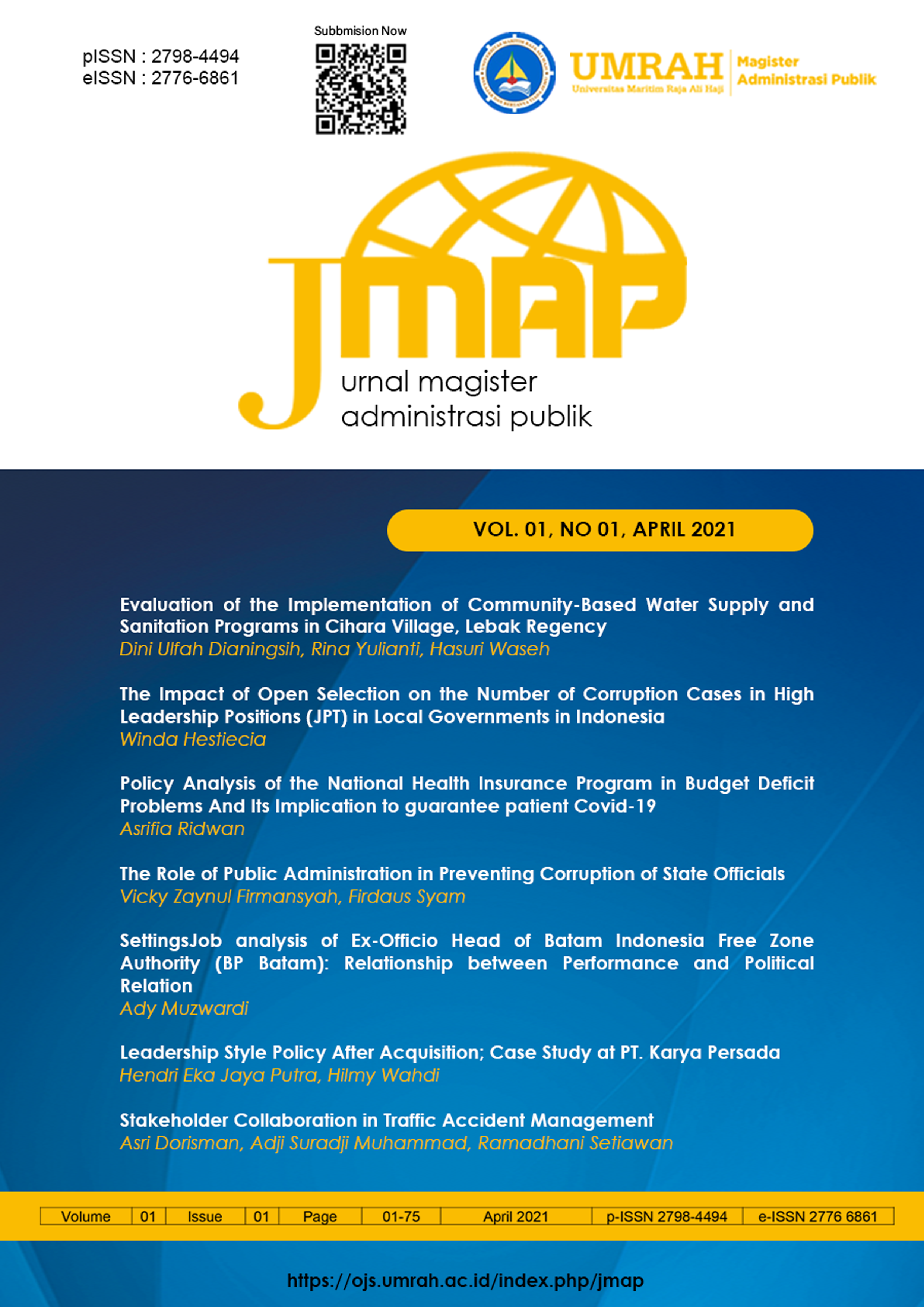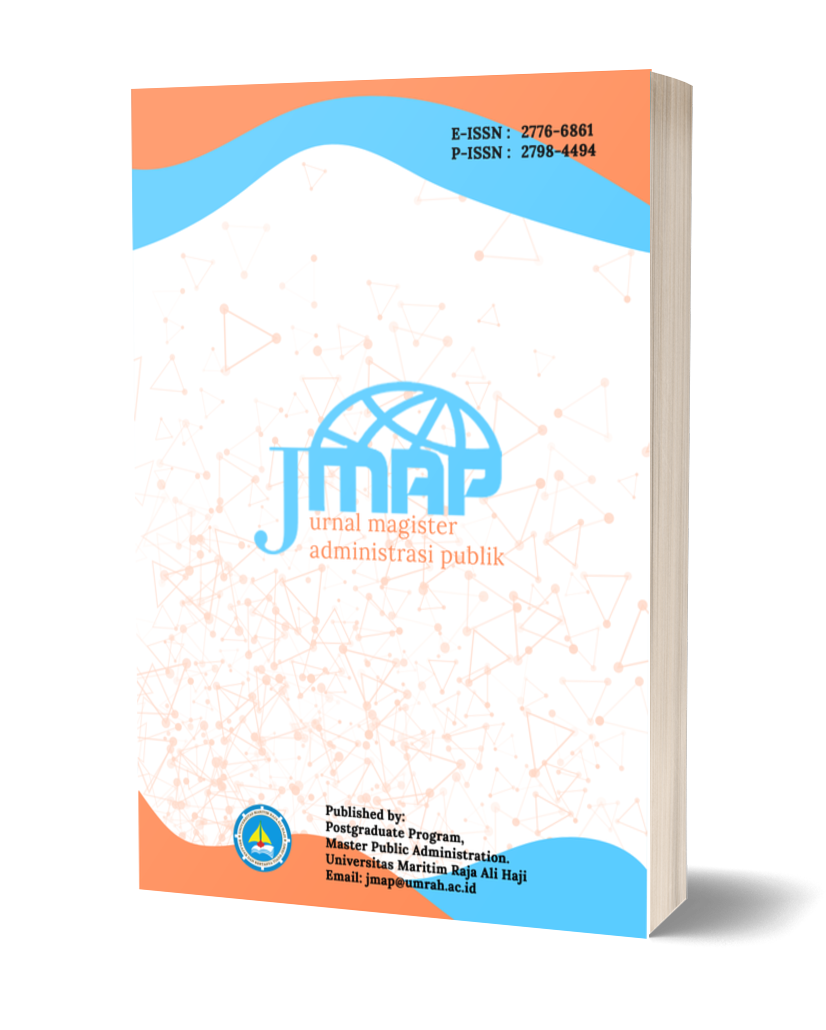Leadership Style Policy After Acquisition; Case Study at PT. Karya Persada
DOI:
https://doi.org/10.31629/jmap.v1i1.3373Keywords:
Leadership, Organization, PolicyAbstract
The purpose of this research is to identify changes in the company organization of PT Karya Persada, specifically 1) Examine how the organization of PT Karya Persada has changed since the acquisition. 2. Describe the changes that have occurred. 3. ) Analyzing the relationship between changing organizational aspects at PT. Persada's work. 4). Identifying the anticipation or management strategy used by PT Karya Persada in the face of this change. This research can also academically deepen knowledge about change management, organizational culture, leadership style, and learning organizational, as well as see the extent of its application, supporting factors, and constraints that arise in its application. The descriptive qualitative research methods were used in this study. The data in this study were obtained by conducting interviews with former employees of PT. Karya Persada will go directly to take data at PT. Persada's work that has been obtained from the interview data is processed using NVivo 12 Plus Qualitative Software. According to the findings of this study, there is a change in organizational culture, such as a family-like spirit that becomes more procedural and full of control. Less discipline became much more disciplined from the start. Furthermore, a previously opaque culture has become more transparent, with clearer rewards and punishments, including at higher levels of promotion and career advancement.
Downloads
References
Akhmadeev, B. A. (2015). Merger And Acquisition As A Way Of Corporation Innovative. September. https://doi.org/10.13140/RG.2.1.2219.8249
Arijanto, Agus, & Tim. (2018). Manajemen Perubahan. Moeka Publishing.
Bass, B. M. (2000). The Future of Leadership in Learning Organizations. Journal of Leadership Studies, 7(3), 18–40. https://doi.org/10.1177/107179190000700302
Clemmer, J. (2003). The Leader’s Digest: Timeless Principles for Team and Organization Success. TCG Press.
Cortvriend, P. (2004). Change management of mergers: The impact on NHS staff and their psychological contracts. Health Services Management Research, 17(3), 177–187. https://doi.org/10.1258/0951484041485593
Hinduan, Z. R., Wilson-evered, E., & Moss, S. (2009). Leadership, work outcomes and openness to change following an Indonesian bank merger Zahrotur R. Hinduan, Elisabeth Wilson-Evered, Simon Moss and Evelyn Scannell. 47(1), 59–78. https://doi.org/10.1177/1038411108099290.60
Islam, M. N., Furuoka, F., & Idris, A. (2020). Mapping the relationship between transformational leadership, trust in leadership and employee championing behavior during organizational change. Asia Pacific Management Review, xxxx. https://doi.org/10.1016/j.apmrv.2020.09.002
Maziak, W., & Ward, K. D. (2008). NVivo Qualitative Data Analysis Software. Am J Public Health, 8(July), 2134–2139.
Moleong, L. J. (2018). Metode Penelitian Kualitatif (38th ed.). Rosdakarya.
Robbin, P., S., & Timothy A. Judge. (2017). Organizational Behavior. Pearson Education.
Senge, P. . (1997). “The Fifth Discipline.†Measuring Business Excellence, 1(3), 46-51. https://doi.org/https://doi.org/10.1108/eb025496
Singer, E. (n.d.). Survey Methods as an Opportunity for Analytic Integration in Mixed Methods Evaluation Qualitative Research and Innovations Series Presented by NVivo & SAGE Publishing.
Sugiyono. (2017). Metode Penelitian Kuantitatif & Kualitatif (4th ed.). Alfabeta.
Tobin, D. R. (1997). The Knowledge- enable organization : moving from “training†to “learningâ€, to meet business goal (3rd ed.). Amacom.
Tortorella, G. L., Cawley Vergara, A. Mac, Garza-Reyes, J. A., & Sawhney, R. (2020). Organizational learning paths based upon industry 4.0 adoption: An empirical study with Brazilian manufacturers. International Journal of Production Economics, 219 (July 2019), 284–294. https://doi.org/10.1016/j.ijpe.2019.06.023
Wirawan. (2013). Kepemimpinan: Teori, Psikologi, Perilaku Organisasi, Aplikasi dan Penelitian. Raja Grafindo Persada.
Wren, D. A., & Arthur G. Bedeian. (2008). Organizational Behavior and Organization Theory. Chapter The Evolution of Management Thought (7th ed.). Wiley.
Wulandari, P., Mangundjaya, W., & Utoyo, D. B. (2015). Is Job Satisfaction a Moderator or Mediator on the Relationship between Change Leadership and Commitment to Change? Procedia - Social and Behavioral Sciences, 172(2013), 104–111. https://doi.org/10.1016/j.sbspro.2015.01.342
Downloads
Published
Issue
Section
License
You are free to:
- Share — copy and redistribute the material in any medium or format for any purpose, even commercially.
- Adapt — remix, transform, and build upon the material for any purpose, even commercially.
- The licensor cannot revoke these freedoms as long as you follow the license terms.
Under the following terms:
- Attribution — You must give appropriate credit, provide a link to the license, and indicate if changes were made . You may do so in any reasonable manner, but not in any way that suggests the licensor endorses you or your use.
- ShareAlike — If you remix, transform, or build upon the material, you must distribute your contributions under the same license as the original.
- No additional restrictions — You may not apply legal terms or technological measures that legally restrict others from doing anything the license permits.

































